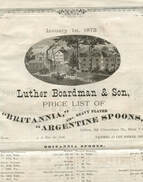The Boardman Family - History of the Boardman Empire |

The Boardman Silversmith industry was founded by Luther Boardman in 1840. In 1842 he had invented and patented an improved mold for creating britannia silverware. He later traveled from Chester to Moodus and purchased land and water rights to start his factory. On May 3rd 1842, Luther moved his silversmithing company to East Haddam and immediately began creating britannia spoons.
The industry was a huge success and the Boardman Company began to ship their wares down the Connecticut River and across the world. In 1847 Luther rented power and space in the Brownell factory in Moodus and for a time made spoons there. He also experimented with horse power to supplement the lack of necessary power provided by his water mills. These temporary fixes to his power needs were vastly inadequate and in 1850 Luther Boardman installed a 16 Horsepower steam engine. The next year he purchased the rights of the Sears Grist Mill and built a reservoir to further increase the power to his factories.
In 1856 Luther Boardman built a new office and shop just downstream of his reservoir. It was used for administrative purposes and inspecting and packaging spoons. Once spoons and other wares were made, a salesman would travel to general stores across the coast and procure orders of shipments. From there, crates of Boardman spoons were loaded aboard large steamboats at the Goodspeed landing and shipped to major port cities like New York and Boston. Boardman Spoons can still be found today all across the United States.
The Boardman silversmith empire reached its peak in 1862 and lasted until 1880 when the general use of tinned iron spoons had, to a large extent, driven the Boardman britannia spoons out of business. During the year 1864, Luther Boardman and his son Norman Boardman went into partnership under the firm name of L. Boardman & Son. Upon Luther's death in 1887, the business continued under the same name, and on January 1st 1900, Norman Boardman's Son, Eugene, became partners. However, upon entering the new century, the Boardman britannia ware empire was a shell of its former self. In 1907, after leasing the factory to another company, a fire broke out and destroyed the main office and factory fatally crippling the L. Boardman & Son company.
The Boardman family is buried in Riverview cemetery besides St. Stephens Episcopal Church in East Haddam. Their reservoir is now known as Boardman pond, and little evidence remains on the former site of the Boardman Britannia Spoon Mill.
The industry was a huge success and the Boardman Company began to ship their wares down the Connecticut River and across the world. In 1847 Luther rented power and space in the Brownell factory in Moodus and for a time made spoons there. He also experimented with horse power to supplement the lack of necessary power provided by his water mills. These temporary fixes to his power needs were vastly inadequate and in 1850 Luther Boardman installed a 16 Horsepower steam engine. The next year he purchased the rights of the Sears Grist Mill and built a reservoir to further increase the power to his factories.
In 1856 Luther Boardman built a new office and shop just downstream of his reservoir. It was used for administrative purposes and inspecting and packaging spoons. Once spoons and other wares were made, a salesman would travel to general stores across the coast and procure orders of shipments. From there, crates of Boardman spoons were loaded aboard large steamboats at the Goodspeed landing and shipped to major port cities like New York and Boston. Boardman Spoons can still be found today all across the United States.
The Boardman silversmith empire reached its peak in 1862 and lasted until 1880 when the general use of tinned iron spoons had, to a large extent, driven the Boardman britannia spoons out of business. During the year 1864, Luther Boardman and his son Norman Boardman went into partnership under the firm name of L. Boardman & Son. Upon Luther's death in 1887, the business continued under the same name, and on January 1st 1900, Norman Boardman's Son, Eugene, became partners. However, upon entering the new century, the Boardman britannia ware empire was a shell of its former self. In 1907, after leasing the factory to another company, a fire broke out and destroyed the main office and factory fatally crippling the L. Boardman & Son company.
The Boardman family is buried in Riverview cemetery besides St. Stephens Episcopal Church in East Haddam. Their reservoir is now known as Boardman pond, and little evidence remains on the former site of the Boardman Britannia Spoon Mill.
|
See some of our Boardman Family Collection
|
